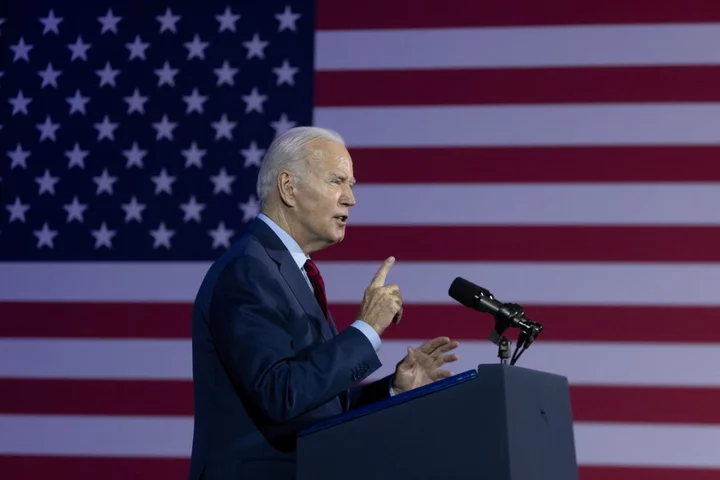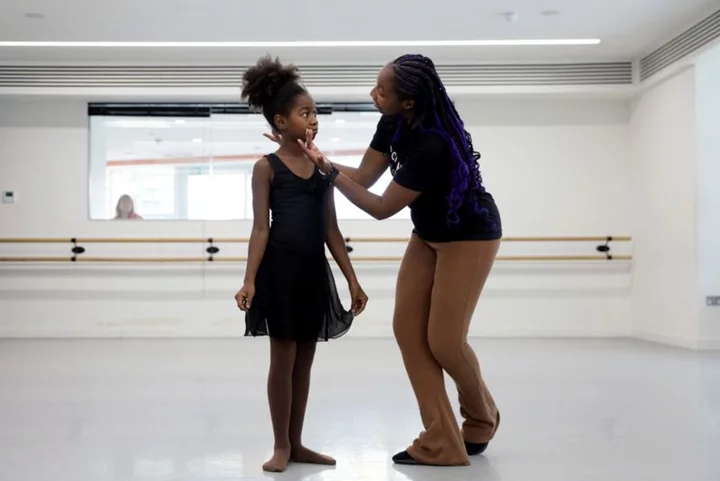One year after the US Supreme Court revoked a constitutional right to abortion care, President Joe Biden warned Americans about Republican plans for a national ban and threats to contraception and birth control. The Supreme Court’s conservative majority decision to overturn Roe v Wade triggered a wave of anti-abortion laws across the US. More than a dozen states, mostly in the South, have effectively outlawed most or all abortions with few, if any, exceptions. Women’s March organisers and abortion rights advocacy groups rallied thousands of Americans in dozens of demonstrations held in cities across the US, hoping to build political momentum to combat anti-abortion candidates and secure federal protections for abortion care in 2024. Demonstrators in Washington DC marched to the Supreme Court. Marches for abortion rights have also joined Pride parades and Pride events, linking the fight for reproductive healthcare as part of a broader threat to civil liberties. “Extreme and dangerous abortion bans” across the US “put the health and lives of women in jeopardy, force women to travel hundreds of miles for care, and threaten to criminalize doctors for providing the health care that their patients need and that they are trained to provide,” Mr Biden said in a statement on Saturday. State bans are “just the beginning,” he added. In a speech to abortion rights’ advocates in North Carolina on Saturday, Vice President Kamala Harris said anti-abortion laws have sparked a healthcare crisis and “chaos, confusion and fear” among providers and pregnant patients – an agenda that “extremist” anti-abortion lawmakers plan to take national, she said. After the decision in Dobbs v Jackson Women’s Health Organization last year, Republicans have said that the Supreme Court ruling merely left abortion restrictions up to states. But anti-abortion lawmakers, and candidates for the 2024 Republican presidential nomination, are pushing for a national ban that would also strike down state laws that protect and expand abortion access. Congressional Republicans have passed several anti-abortion measures with national implications, and third-ranking House Republican Elise Stefanik has signalled that the party is preparing to introduce a ban on abortion at 15 weeks of pregnancy. Candidates vying for the Republican nomination for president in 2024 are mulling their proposals for national bans. Former vice president Mike Pence and South Carolina Senator Tim Scott have pledged support for a 15-week ban. Florida Governor Ron DeSantis has outlawed abortion in his state at six weeks of pregnancy, before many women know they are pregnant. Donald Trump, who has suggested that his main rival went too far with a six-week ban, also blamed Republicans’ poor outcomes in 2022 midterm elections on their anti-abortion platforms. In moves over the last year that have tested the limits of his presidency, Mr Biden issued a series of executive actions and memorandums to federal agencies to affirm access to abortion drugs and reproductive healthcare. The US Department of Justice also joined state and federal legal challenges to protect abortion access. Mr Biden’s latest order directs federal agencies to find ways to ensure and expand access to birth control. Congressional Republicans have refused to back Democratic bills that would codify the right to contraception. In Nevada, the state’s Republican governor, Joe Lombardo, recently vetoed legislation that would guarantee a right to contraception access, a move that abortion rights advocates fear is a sign of similar actions to come. Republican officials are also supporting the legal battle from anti-abortion activists to revoke the federal government’s approval of a widely-used abortion drug. That case is expected to land before the Supreme Court, where justices could deliver yet another ruling with massive consequences for abortion care. “Congressional Republicans want to ban abortion nationwide, but go beyond that, by taking FDA-approved medication for terminating a pregnancy, off the market, and make it harder to obtain contraception,” Mr Biden said in his statement. “Their agenda is extreme, dangerous, and out-of-step with the vast majority of Americans.” More than 60 per cent of Americans disagree with the decision in Dobbs, according to polling from NBC News. That figure includes nearly 80 per cent of women aged 18-49; two-thirds of women who live in the suburbs; 60 per cent of independent voters; and one-third of all Republican voters. A record 69 per cent of Americans believe abortion should be legal within the first three months of pregnancy, according to a recent Gallup poll, marking an increase of at least 2 per cent in the last year. More than half of Americans believe abortion is morally acceptable – a 10 per cent increase since 2001. A separate poll from USA Today/Suffolk University found that one in four Americans say states’ efforts to restrict abortion access have made them more supportive of abortion rights. The Supreme Court’s decision to overturn Roe v Wade has also alarmed other civil rights groups who fear the conservative court could take aim at fundamental rights to privacy and constitutional rights to due process and equal protection under the law. In his concurring opinion, conservative Justice Clarence Thomas suggested that the court should “revisit” landmark cases involving the right to contraception, same-sex relationships and marriage equality. In remarks to abortion rights advocates on 23 June, Mr Biden said the Dobbs decision “risks the broader rights of privacy for everyone”. “That’s because the fundamental right to privacy, which Roe recognized, has served as a basis for so many other rights that are ingrained in the fabric of our country: the right to make the best decisions for your health, the right to use birth control,” Mr Biden added. “Did you ever think we’d be arguing about that?” He singled out the opinion from Justice Thomas. “These guys are serious, man. I said it when the decision came out, and people looked at me like I was exaggerating. But they’re not stopping here,” Mr Biden said. “Make no mistake, this election is about freedom on the ballot once again.” The president also pointed to victories for abortion rights in Kansas, Kentucky and Michigan in the wake of the Dobbs ruling. “I said at the time that I didn’t think the Court – or, for that matter, the Republican Party, who for decades have pushed their extreme agenda – have a clue about the power of women in America,” Mr Biden said in his remarks. “I said they were about to find out.” Read More One year after Roe v Wade fell, anti-abortion laws threaten millions. The battle for access is far from over The religious right used to be uneasy about Trump – but his dominance is now complete Mike Pence calls for 15-week abortion ban on eve of anniversary of Roe being overturned Anti-abortion laws harm patients facing dangerous and life-threatening complications, report finds Where abortion laws stand in every state a year after the Supreme Court overturned Roe Evangelical leader hopes conference is 'testosterone booster shot' for anti-abortion 2024 candidates
One year after the US Supreme Court revoked a constitutional right to abortion care, President Joe Biden warned Americans about Republican plans for a national ban and threats to contraception and birth control.
The Supreme Court’s conservative majority decision to overturn Roe v Wade triggered a wave of anti-abortion laws across the US. More than a dozen states, mostly in the South, have effectively outlawed most or all abortions with few, if any, exceptions.
Women’s March organisers and abortion rights advocacy groups rallied thousands of Americans in dozens of demonstrations held in cities across the US, hoping to build political momentum to combat anti-abortion candidates and secure federal protections for abortion care in 2024.
Demonstrators in Washington DC marched to the Supreme Court. Marches for abortion rights have also joined Pride parades and Pride events, linking the fight for reproductive healthcare as part of a broader threat to civil liberties.
“Extreme and dangerous abortion bans” across the US “put the health and lives of women in jeopardy, force women to travel hundreds of miles for care, and threaten to criminalize doctors for providing the health care that their patients need and that they are trained to provide,” Mr Biden said in a statement on Saturday.
State bans are “just the beginning,” he added.
In a speech to abortion rights’ advocates in North Carolina on Saturday, Vice President Kamala Harris said anti-abortion laws have sparked a healthcare crisis and “chaos, confusion and fear” among providers and pregnant patients – an agenda that “extremist” anti-abortion lawmakers plan to take national, she said.
After the decision in Dobbs v Jackson Women’s Health Organization last year, Republicans have said that the Supreme Court ruling merely left abortion restrictions up to states.
But anti-abortion lawmakers, and candidates for the 2024 Republican presidential nomination, are pushing for a national ban that would also strike down state laws that protect and expand abortion access.
Congressional Republicans have passed several anti-abortion measures with national implications, and third-ranking House Republican Elise Stefanik has signalled that the party is preparing to introduce a ban on abortion at 15 weeks of pregnancy.
Candidates vying for the Republican nomination for president in 2024 are mulling their proposals for national bans.
Former vice president Mike Pence and South Carolina Senator Tim Scott have pledged support for a 15-week ban. Florida Governor Ron DeSantis has outlawed abortion in his state at six weeks of pregnancy, before many women know they are pregnant. Donald Trump, who has suggested that his main rival went too far with a six-week ban, also blamed Republicans’ poor outcomes in 2022 midterm elections on their anti-abortion platforms.
In moves over the last year that have tested the limits of his presidency, Mr Biden issued a series of executive actions and memorandums to federal agencies to affirm access to abortion drugs and reproductive healthcare. The US Department of Justice also joined state and federal legal challenges to protect abortion access.
Mr Biden’s latest order directs federal agencies to find ways to ensure and expand access to birth control.
Congressional Republicans have refused to back Democratic bills that would codify the right to contraception.
In Nevada, the state’s Republican governor, Joe Lombardo, recently vetoed legislation that would guarantee a right to contraception access, a move that abortion rights advocates fear is a sign of similar actions to come.
Republican officials are also supporting the legal battle from anti-abortion activists to revoke the federal government’s approval of a widely-used abortion drug.
That case is expected to land before the Supreme Court, where justices could deliver yet another ruling with massive consequences for abortion care.
“Congressional Republicans want to ban abortion nationwide, but go beyond that, by taking FDA-approved medication for terminating a pregnancy, off the market, and make it harder to obtain contraception,” Mr Biden said in his statement.
“Their agenda is extreme, dangerous, and out-of-step with the vast majority of Americans.”
More than 60 per cent of Americans disagree with the decision in Dobbs, according to polling from NBC News.
That figure includes nearly 80 per cent of women aged 18-49; two-thirds of women who live in the suburbs; 60 per cent of independent voters; and one-third of all Republican voters.
A record 69 per cent of Americans believe abortion should be legal within the first three months of pregnancy, according to a recent Gallup poll, marking an increase of at least 2 per cent in the last year. More than half of Americans believe abortion is morally acceptable – a 10 per cent increase since 2001.
A separate poll from USA Today/Suffolk University found that one in four Americans say states’ efforts to restrict abortion access have made them more supportive of abortion rights.
The Supreme Court’s decision to overturn Roe v Wade has also alarmed other civil rights groups who fear the conservative court could take aim at fundamental rights to privacy and constitutional rights to due process and equal protection under the law.
In his concurring opinion, conservative Justice Clarence Thomas suggested that the court should “revisit” landmark cases involving the right to contraception, same-sex relationships and marriage equality.
In remarks to abortion rights advocates on 23 June, Mr Biden said the Dobbs decision “risks the broader rights of privacy for everyone”.
“That’s because the fundamental right to privacy, which Roe recognized, has served as a basis for so many other rights that are ingrained in the fabric of our country: the right to make the best decisions for your health, the right to use birth control,” Mr Biden added. “Did you ever think we’d be arguing about that?”
He singled out the opinion from Justice Thomas.
“These guys are serious, man. I said it when the decision came out, and people looked at me like I was exaggerating. But they’re not stopping here,” Mr Biden said. “Make no mistake, this election is about freedom on the ballot once again.”
The president also pointed to victories for abortion rights in Kansas, Kentucky and Michigan in the wake of the Dobbs ruling.
“I said at the time that I didn’t think the Court – or, for that matter, the Republican Party, who for decades have pushed their extreme agenda – have a clue about the power of women in America,” Mr Biden said in his remarks. “I said they were about to find out.”
Read More
One year after Roe v Wade fell, anti-abortion laws threaten millions. The battle for access is far from over
The religious right used to be uneasy about Trump – but his dominance is now complete
Mike Pence calls for 15-week abortion ban on eve of anniversary of Roe being overturned
Anti-abortion laws harm patients facing dangerous and life-threatening complications, report finds
Where abortion laws stand in every state a year after the Supreme Court overturned Roe
Evangelical leader hopes conference is 'testosterone booster shot' for anti-abortion 2024 candidates









